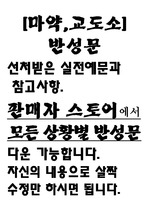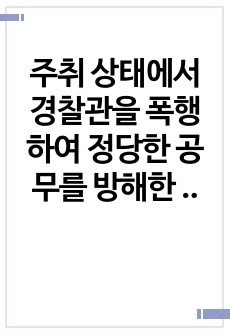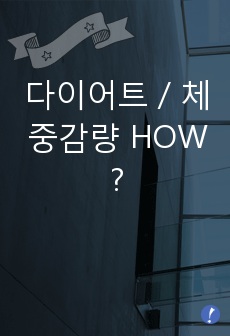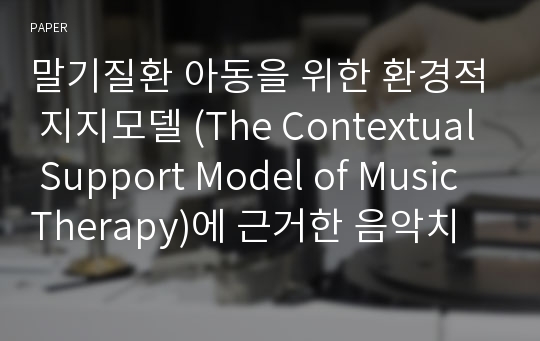말기질환 아동을 위한 환경적 지지모델 (The Contextual Support Model of Music Therapy)에 근거한 음악치료사례연구
* 본 문서는 배포용으로 복사 및 편집이 불가합니다.
서지정보
ㆍ발행기관 : 한국음악치료교육학회
ㆍ수록지정보 : 인간행동과 음악연구 / 2권 / 2호
ㆍ저자명 : 전미혜
ㆍ저자명 : 전미혜
목차
연구 방법연구 결과
결 론
참고 문헌
한국어 초록
아동에게 있어서 말기 질환의 범위는 악성종양을 비롯하여 선천성 대사이상, 염색체 이상, 선천성 기형, 신경근육계 질환, 기타 다른 불치의 상태까지 포함한다. 병원환경에서 이러한 말기 질환 아동은 질병의 치료 과정과 관련하여 공포심, 분노, 좌절감을 경험할 수 있으며 통제된 병원 환경 안에서 자율성을 제한받기 때문에 통제감을 상실하고 무기력해질 수 있다.본 연구에서는 환경적 지지 모델(Contextual Support Model of Music Thterapy)을 중심으로 음악치료가 병원환경에 있는 말기질환자들의 정서 및 기능 변화에 긍정적 변화를 줄 수 있는지를 알아보았다. 환경적지지 모델 음악치료는 음악 환경의 구조적인 특성(structure), 자발성 지지(autonomy support) 그리고 참여(involvement)라는 세 가지 요소로 구성된다. 그리고 이러한 치료적 구성 요소로 이루어진 음악 환경은 아동의 활동을 지지하고 격려하도록 도와준다. 이 세 가지 치료적 요소를 중심으로 하여 본 연구는 말기질환 아동과의 음악치료사례를 분석하여 말기 질환 아동의 행동이 환경적 지지 역할을 하는 음악 안에서 어떠한 유형으로 나타나는지에 대해서 알아보았다.
본 연구의 대상자는 만 10살의 급성 림프성 백혈병 여아로 총 9회의 세션을 통한 음악 치료 활동 내용을 질적 연구방법으로 사용하여 내용분석을 하였다. 내용분석은 환경적 지지모델의 세가지 치료적 요소 중심으로 본 연구자가 설정한 행동들을 기준으로 이루어졌다. 환아와의 주 음악 치료 활동은 악기 연주하며 노래부르기, CD플레이어로 노래 들으면서 노래 부르기, 노래 만들기, 노래 가사 탐색하기 활동으로 이루어졌다.
본 연구의 결과는 다음과 같다. 환경적인 구조적 특성(Structure) 측면에서는 음악치료는 노래 를 부를 수 있는 환경과 악기를 연주할 수 있는 환경을 제공해주고 음악 만들기 활동을 할 수 있 는 준비를 해줌으로써 아동이 성공적으로 음악 활동을 할 수 있도록 방향을 제시해주었다. 자발성 지지(Autonomy support) 측면에서 음악치료는 노래를 부르거나 악기를 연주할 때 여러 가지 선 택의 기회를 제공함으로써 아동이 자발적으로 참여할 수 있도록 하였다. 참여(Involvement)의 측 면에서는 치료사가 아동에게 긍정적인 강화를 제시함으로써 아동이 긍정적으로 경험하고 공유된 활동 안에서 치료사와 상호 협력적으로 음악활동을 진행하는 모습을 볼 수 있었다.
이와 같이 음악치료는 환경적으로 지지 역할을 하며 정서적으로 위축되어있는 아동에게 자발성과 독립성을 개발시켜주고 병원 환경이라는 제약된 환경 안에서 자율성을 촉진시켜줄 수 있음을 보여주었다. 이러한 음악 치료의 효과를 근거로 하여 입원 환경에 있는 아동들을 위한 더 다양한 접근 방법의 음악치료 연구가 이루어지기를 기대한다.
영어 초록
Terminal pediatric patient include congenital metabolic abnormalities, chromosome aberrations, congenital anomalies, neuromuscular diseases and other incurable conditions as well as malignant tumors. One third of these diseases are cancers, and two thirds of cancers are lymphadenoma and leukemia. Terminal pediatric patient may feel fear, anger and frustration against treatment process in hospitals, lose control of themselves and stay in helplessness due to restrictions within controlled hospital environment.This study examined the relationship between hospitalized childrens behavior and music using Contextual Support Model of Music Therapya theory stating therapeutic music environments possess three elements of Structure, Autonomy support and Involvement, and increase childrens active engagement. Focused on these three therapeutic elements, this study analyzed music therapy cases of terminally ill children to examine the relationship between childrens behavior and music as environmental supportive medium in the environment.
This study is on a single case case subject, a 10-year-old girl with acute lymphocytic leukemia. Nine sessions of music therapy activities were conducted and analyzed using qualitative method. Focusing on three therapeutic elements of Contextual Support Model, analysis of sessions was made on the basis of activities specifically designed for this study. Main music therapy activities included singing while playing musical instruments, singing while listening to music through CD player, making up songs, and searching for song lines.
The findings of this study are as follows: a) in terms of Structure, music therapy suggested a direction for effective musical activities for terminally ill children by providing environments where child can sing, play musical instruments and make up songs; b) in terms of Autonomy support, music therapy encouraged childs voluntary participation by giving her chances to make choice while singing or playing musical instruments; c) in terms of Involvement, child could gain positive approval of the therapist and conduct musical activities in cooperation with the therapist. Music therapy serves as supportive medium in the environment, develops spontaneity and self-reliance in emotionally depressed children, and promotes voluntary attitudes in the restricted hospital environment. Based on the positive effects of music therapy, more studies need to be conducted with an approach to more various terminal pediatric patients.

























